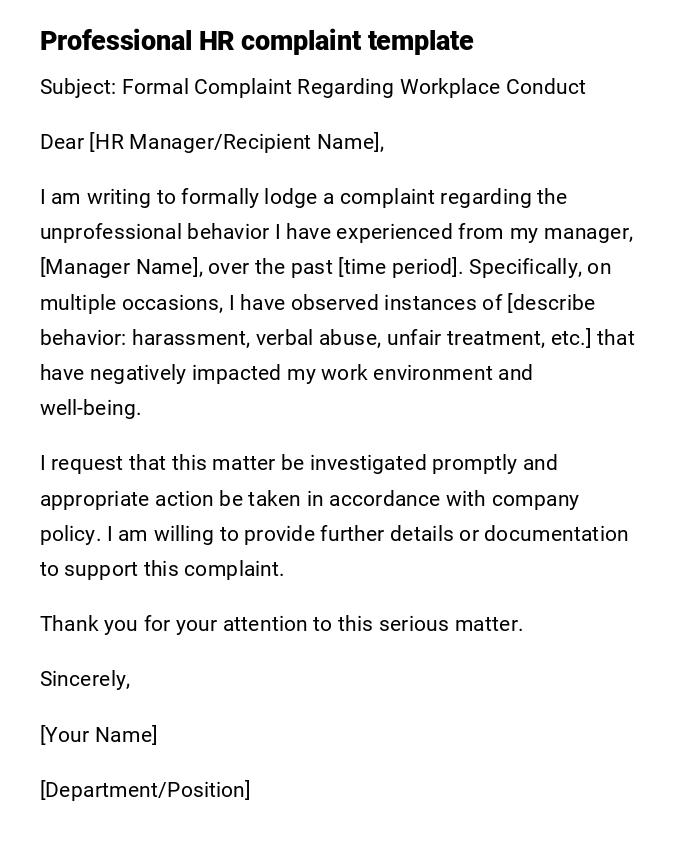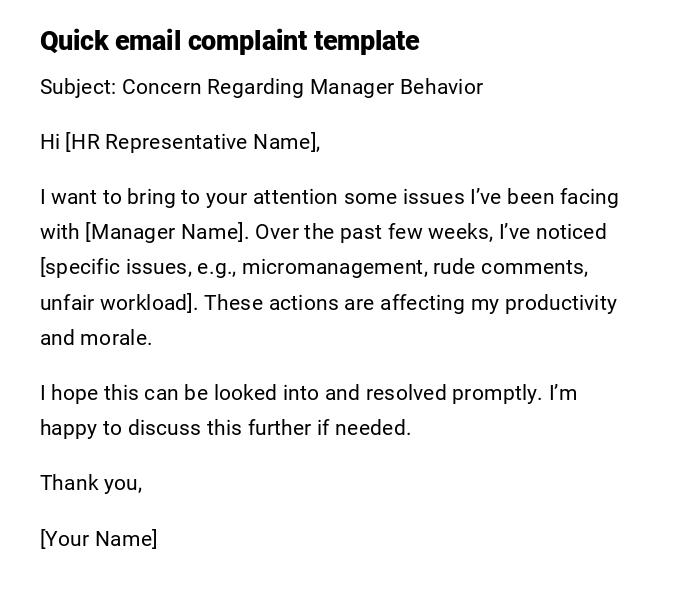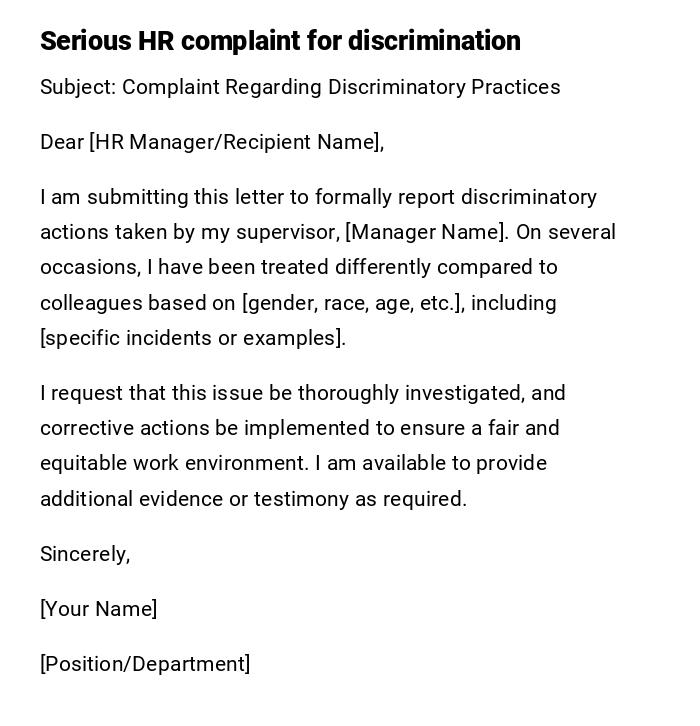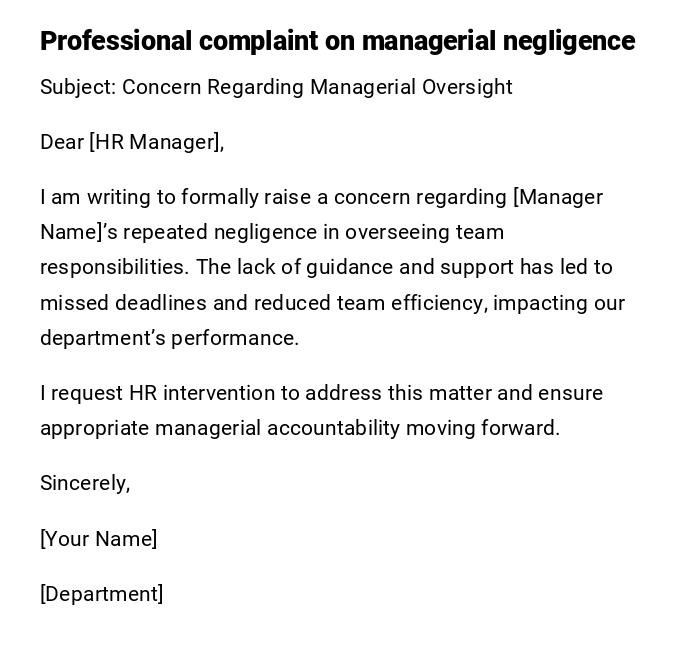Complaint Letter Against Manager Or Supervisor
Subject: Formal Complaint Against [Manager's Name]
Dear [Manager's Name],
I hope this letter finds you well. I am writing to express my deep concern and dissatisfaction with your management style and the way you have been handling the team under your supervision. I believe it is crucial to bring these issues to your attention in the hope of improving the work environment and ensuring the well-being of the team.
Firstly, I want to highlight the lack of effective communication within our team. As the manager, it is your responsibility to maintain an open and transparent line of communication, yet I have repeatedly experienced difficulties in obtaining clear instructions, timely feedback, and essential information needed to carry out my job effectively. This communication breakdown has resulted in confusion, delays, and unnecessary errors, ultimately affecting our team's productivity.
Furthermore, it is disheartening to note the inconsistency in your decision-making process. There have been instances where your decisions seemed arbitrary and lacked a proper rationale or consideration of the team's input. This has led to a sense of frustration and demotivation among team members, as our efforts and suggestions are often overlooked or dismissed without justification.
Additionally, I have observed a concerning lack of support and guidance from your end. As a supervisor, it is vital to provide mentorship and assistance to your team members, especially in areas where they may be struggling or require further development. However, I have felt unsupported and left to navigate challenges on my own, which has hindered my professional growth and overall job satisfaction.
Furthermore, I have noticed a consistent pattern of favoritism within the team. It appears that certain individuals receive preferential treatment, which not only undermines the principles of fairness and equality but also creates a divisive and unhealthy work environment. Such favoritism can breed resentment and negatively impact team dynamics and morale.
Lastly, I must express my concern about the overall work-life balance within our team. Under your management, there has been an increasing trend of excessive work hours, unreasonable deadlines, and unrealistic expectations placed upon team members. This has resulted in increased stress levels, decreased job satisfaction, and, in some cases, compromised physical and mental well-being.
I believe it is in the best interest of the team and the company to address these issues promptly and constructively. I kindly request that you take the following actions:
1. Improve communication by establishing regular team meetings, providing clear instructions, and promptly responding to queries and concerns.
2. Adopt a more consistent and fair decision-making process by considering the team's input and providing transparent justifications for your decisions.
3. Provide adequate support and guidance to team members by offering mentorship, training opportunities, and addressing individual needs and challenges.
4. Promote a fair and inclusive work environment by avoiding favoritism and treating all team members equitably.
5. Prioritize work-life balance by setting realistic expectations, promoting reasonable deadlines, and encouraging a healthy work environment.
I hope we can work together to resolve these issues and foster a more positive and productive work environment. I would appreciate the opportunity to discuss these matters further in person and explore potential solutions. Please let me know when you would be available for a meeting.
Thank you for your attention to this matter. I look forward to a prompt and constructive response.
Sincerely,
[Your Name]
Formal Complaint Letter Against Manager for Unprofessional Behavior
Subject: Formal Complaint Regarding Workplace Conduct
Dear [HR Manager/Recipient Name],
I am writing to formally lodge a complaint regarding the unprofessional behavior I have experienced from my manager, [Manager Name], over the past [time period]. Specifically, on multiple occasions, I have observed instances of [describe behavior: harassment, verbal abuse, unfair treatment, etc.] that have negatively impacted my work environment and well-being.
I request that this matter be investigated promptly and appropriate action be taken in accordance with company policy. I am willing to provide further details or documentation to support this complaint.
Thank you for your attention to this serious matter.
Sincerely,
[Your Name]
[Department/Position]
Informal Email Complaint About Manager's Conduct
Subject: Concern Regarding Manager Behavior
Hi [HR Representative Name],
I want to bring to your attention some issues I’ve been facing with [Manager Name]. Over the past few weeks, I’ve noticed [specific issues, e.g., micromanagement, rude comments, unfair workload]. These actions are affecting my productivity and morale.
I hope this can be looked into and resolved promptly. I’m happy to discuss this further if needed.
Thank you,
[Your Name]
Complaint Letter for Discrimination or Bias by Supervisor
Subject: Complaint Regarding Discriminatory Practices
Dear [HR Manager/Recipient Name],
I am submitting this letter to formally report discriminatory actions taken by my supervisor, [Manager Name]. On several occasions, I have been treated differently compared to colleagues based on [gender, race, age, etc.], including [specific incidents or examples].
I request that this issue be thoroughly investigated, and corrective actions be implemented to ensure a fair and equitable work environment. I am available to provide additional evidence or testimony as required.
Sincerely,
[Your Name]
[Position/Department]
Complaint Letter About Manager's Negligence Affecting Work
Subject: Concern Regarding Managerial Oversight
Dear [HR Manager],
I am writing to formally raise a concern regarding [Manager Name]’s repeated negligence in overseeing team responsibilities. The lack of guidance and support has led to missed deadlines and reduced team efficiency, impacting our department’s performance.
I request HR intervention to address this matter and ensure appropriate managerial accountability moving forward.
Sincerely,
[Your Name]
[Department]
Elements and Structure of a Complaint Letter Against a Manager
- Subject Line: Clearly states that it is a complaint.
- Greeting: Addressed to HR or appropriate authority.
- Introduction: State purpose of the letter clearly.
- Specific Details: Include dates, incidents, and examples.
- Impact Statement: Explain how the manager's actions affect you or the team.
- Request: Specify desired actions or outcomes.
- Attachments: Include evidence, if applicable (emails, screenshots, records).
- Closing: Professional sign-off with name, position, and contact info.
When to Send a Complaint Letter Against a Supervisor
- When experiencing harassment or bullying.
- If subjected to discrimination or bias.
- In cases of repeated unprofessional conduct.
- When managerial negligence affects work performance.
- After internal attempts to resolve the issue have failed.
Who Should Send a Complaint Letter Against a Manager
- Employees who have directly experienced misconduct.
- Team members witnessing unethical or unprofessional behavior.
- HR liaison may guide the process, but the affected employee usually submits it.
- Any staff member following company grievance policies.
Whom Should the Complaint Letter Be Addressed To
- HR department or Human Resources Manager.
- Higher-level management if HR is not available.
- Company grievance committee or ethics officer.
- In some cases, legal counsel may be included for serious violations.
How to Write and Send a Complaint Letter
- Remain professional and factual; avoid emotional language.
- Provide specific examples with dates and impact.
- Clearly outline the requested resolution.
- Keep the tone neutral but serious.
- Use formal channels such as HR email or printed letter submission.
- Keep a copy for personal records.
Formatting Guidelines for a Complaint Letter
- Length: 1–2 pages maximum.
- Tone: Professional, serious, factual.
- Style: Formal; avoid casual language.
- Mode: Email or printed letter, depending on company policy.
- Wording: Clear, concise, and neutral; avoid slander.
Requirements and Prerequisites Before Sending a Complaint Letter
- Document all incidents with dates and details.
- Collect supporting evidence (emails, messages, witness statements).
- Understand company grievance policy.
- Ensure all informal attempts to resolve the matter have been made.
- Prepare mentally for formal investigation processes.
Common Mistakes to Avoid in a Complaint Letter
- Using accusatory or emotional language.
- Providing vague or unsupported claims.
- Sending the letter without proof or documentation.
- Copying irrelevant parties unnecessarily.
- Ignoring company grievance procedures.
Tricks and Tips for Effective Complaint Letters
- Stick to facts, not opinions.
- Use bullet points for clarity on multiple incidents.
- Keep a calm and professional tone throughout.
- Include requested resolutions clearly.
- Maintain copies and evidence for HR follow-up.
After Sending a Complaint Letter: Follow-Up Actions
- Confirm receipt with HR.
- Track the progress of the investigation.
- Avoid retaliation or confrontations with the manager.
- Cooperate fully with HR inquiries.
- Document any further incidents during the investigation.
Pros and Cons of Sending a Complaint Letter Against a Supervisor
Pros:
- Officially documents the issue for HR.
- May lead to corrective actions and improved work environment.
- Protects employee rights and well-being.
Cons:
- May strain professional relationships.
- Could lead to stress during investigation.
- Risk of manager retaliation if not properly handled (though protection is often provided by HR policies).
FAQ About Complaint Letters Against Managers
-
Q: Can I send an anonymous complaint?
A: Most companies prefer identified complaints for investigation, but anonymous reporting may be possible through specific channels. -
Q: How long does it take for HR to respond?
A: Response time varies; typically within 1–2 weeks. -
Q: Should I include witnesses?
A: Yes, mentioning witnesses strengthens your case. -
Q: Can this affect my employment?
A: Properly handled complaints should not negatively impact your position, but following procedures is essential.
Compare and Contrast: Complaint Letter vs. Verbal Complaint
- Complaint Letter: Formal, documented, can be used as evidence; ensures HR investigates.
- Verbal Complaint: Informal, immediate, may lack documentation; relies on memory.
- Similarity: Both communicate the issue to HR or management.
- Difference: Letters are better for serious or repeated issues and protect employee rights.






 Download Word Doc
Download Word Doc
 Download PDF
Download PDF